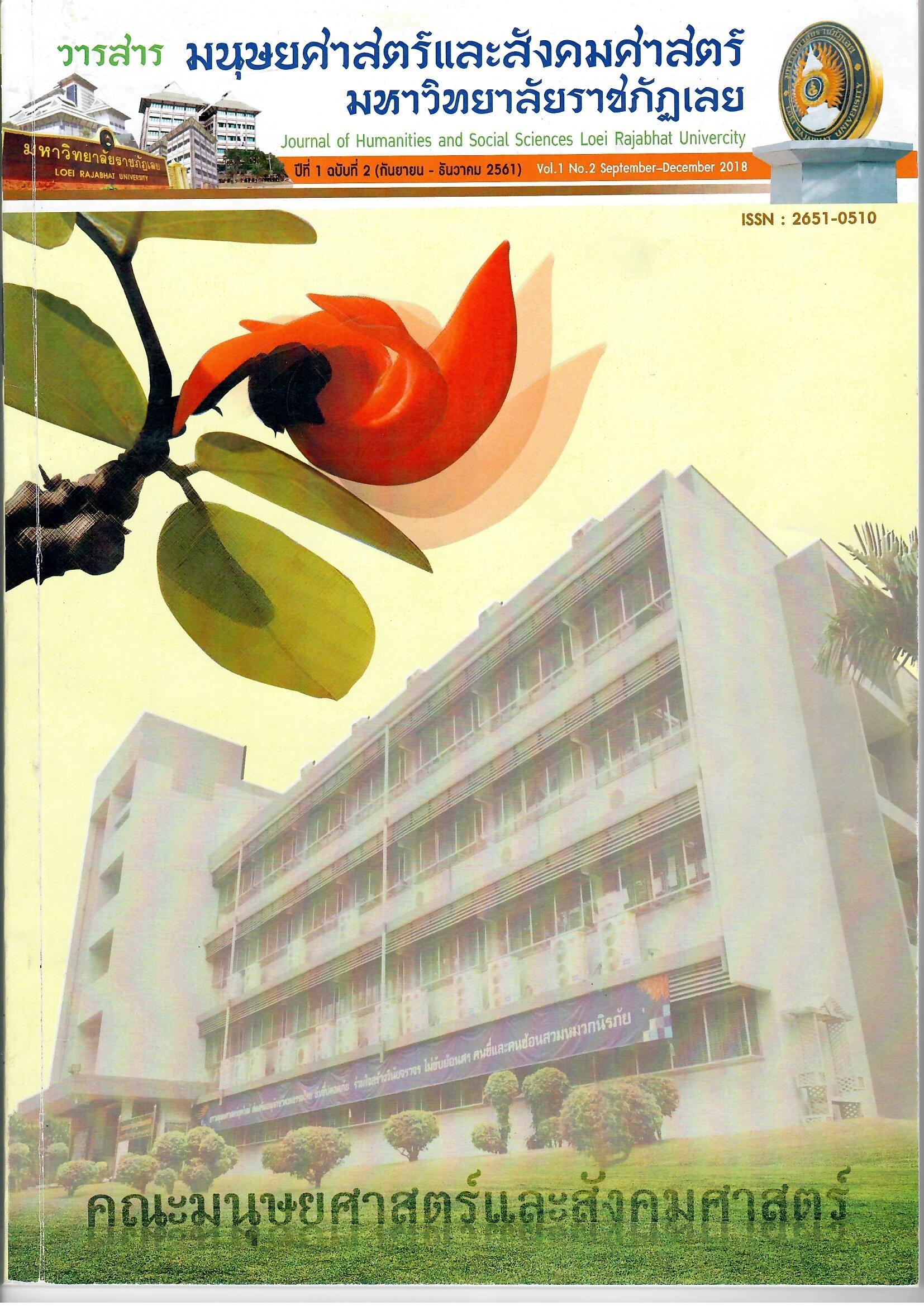Knowledge application of community development principles in professional practice: The course of Field Experience in Community Development 2, Loei Rajabhat University
Keywords:
Community Development Principles, Professional Experience TrainingAbstract
This research is a part of the course of Field Experience in Community Development 2 (2534802), 1st semester, the academic year of 2017, Loei Rajabhat University. This research aims to study the knowledge application of the students from the classroom to their professional practices. This research also investigates the problems of knowledge application. The population of this research is the 98 students enrolled in Field Experience in Community Development 2 (2534802), 1st semester, the academic year of 2017. The data were collected by questionnaire. Percentage, mean, standard deviation are the main analysis of this research. The research findings are as follows: (1) Students in this course are mostly female (88.04%), and the age between 23-24 years are the most common (86.96%). (2) For the community development knowledge, the community development principle was used at the highest level (= 4.57, SD = 0.55). (3) For the knowledge of participation in community development, the knowledge in this group was used at highest level (
= 4.67, S.D. = 0.52). Lastly, (4) knowledge from the core subjects was used at the high level (
= 4.43, S.D. = 0.59).
For the problems of knowledge application, this research found that the students are inability in speaking in the public, solving short-term problems, and establishing relationships with communities. The reason for these problems is because they take too much practice in the office. Therefore, students have a lack of skills in data collection and analysis. Moreover, the ways of data collection for community analysis in the professional practice were different from the classroom because the mentors from the government offices have different ideas and needs.
References
คณะศึกษาศาสตร์ สาขาวิชาพลศึกษา สถาบันการพลศึกษา. วารสารวิชาการ สถาบันการพลศึกษา ปีที่ 3 ฉบับที่ 3 กันยายน – ธันวาคม 2554. หน้า 71 – 85.
ฉัตรทิพย์ นาถสุภา. (2538). วัฒนธรรมไทยกับขบวนการเปลี่ยนแปลงทางสังคม. พิมพ์ครั้งที่ 3.
กรุงเทพฯ : สำนักพิมพ์แห่งจุฬาลงกรณ์มหาวิทยาลัย.
ชัยอนันต์ สมุทวณิช. (2543). ทรรศนะ แนวคิด แนวทางในการปฏิรูปกระบวนการเรียนรู้. วารสาร
ราชบัณฑิตยสถาน ปีที่ 1 ฉบับที่ 1 มกราคม – มีนาคม 2554. หน้า 184 – 189.
ฐิติวรดา แสงสว่างและคณะ. (2551). ความคาดหวัง ความคิดเห็น และความพึงพอใจต่อการ ฝึก
ประสบการณ์วิชาชีพของนักศึกษา คณะวิทยาการจัดการ มหาวิทยาลัยราชภัฏ อุตรดิตถ์: รายงานวิจัย โปรแกรมวิชาการบัญชี คณะวิทยาการจัดการ มหาวิทยาลัย ราชภัฏอุตรดิตถ์.
ฐิรชญา มณีเนตร. (2550). การศึกษาปัจจัยที่มีผลต่อคุณลักษณะด้านการฝึกงานของนักศึกษา ที่พึงประสงค์
ตามความต้องการของสถานประกอบการ: มหาวิทยาลัยขอนแก่น.
ณรัชช์อร ศรีทอง. (2558). กระบวนการสร้างชุมชนที่เข้มแข็ง พึ่งตนเองได้อย่างยั่งยืน. กรุงเทพฯ :
สำนักพิมพ์โอเดียนสโตร์.
บุญชม ศรีสะอาด. (2556). การวิจัยเบื้องต้น. พิมพ์ครั้งที่ 9. กรุงเทพฯ : สุวีรยาสาส์น.
ปาริชาติ วลัยเสถียรและคณะ. (2552). กระบวนการ และเทคนิคการทำงานของนักพัฒนา. พิมพ์ครั้งที่ 4.
กรุงเทพฯ : โครงการเสริมสร้างการเรียนรู้เพื่อชุมชนเป็นสุข (สรส.)
พรรณราย เทียมทันและอนุวัติ คูณแก้ว. (2552). การวิจัยและพัฒนารูปแบบการฝึก ประสบการณ์วิชาชีพ
ของนักศึกษา มหาวิทยาลัยราชภัฏเพชรบูรณ์ , มหาวิทยาลัยราชภัฏเพชรบูรณ์.









